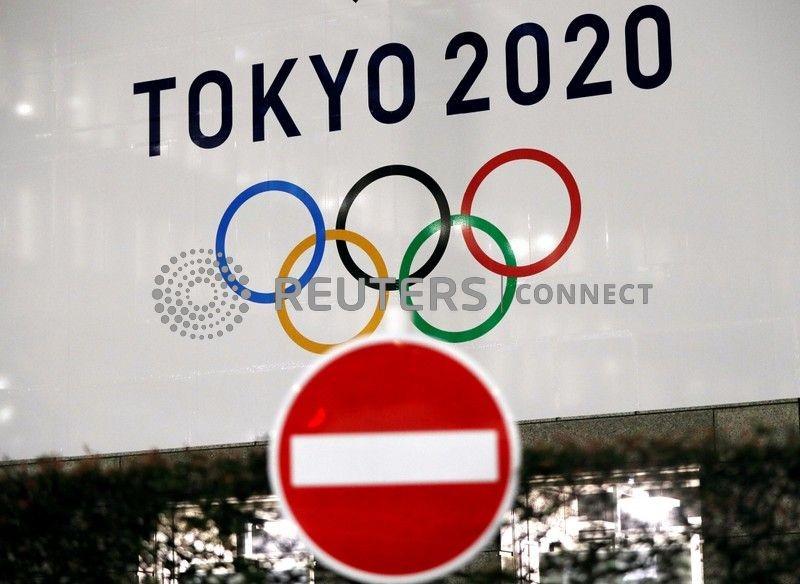TORONTO/TOKYO, (Reuters) – Major sporting nations Australia and Canada quit the Tokyo 2020 Olympics today as organisers faced global pressure to postpone the Games due to the coronavirus crisis for the first time in their 124-year modern history.
Putting back the July 24-Aug. 9 event, as is looking inevitable, would be a massive blow for host Japan which has pumped in more than $12 billion of investment.
Huge sums are also at stake for sponsors and broadcasters.
But a groundswell of concern from athletes – already struggling to train as gyms, stadiums and swimming pools close around the world – appears to be tipping the balance, along with the cancellation of other major sports events.
The International Olympic Committee (IOC) and Japanese government have both edged back from weeks of blanket insistence the Games would go ahead, announcing a month-long consultation over other scenarios including postponement.
The Olympics have never before been delayed, though they were cancelled altogether in 1916, 1940 and 1944 during the World Wars and major Cold War boycotts disrupted the Moscow and Los Angeles Games in 1980 and 1984 respectively.
“The moment the IOC indicates that it is thinking about other solutions, it has already decided to delay the Games,” said French Olympic Committee president Denis Masseglia.
Canada and Australia both bluntly said they would not participate if the Games were not put back to 2021.
“We are in the midst of a global health crisis that is far more significant than sport,” said Canada’s Olympic Committee (COC) and Paralympic Committee (CPC) in a statement.
“STRESS AND UNCERTAINTY”
“Our athletes have been magnificent in their positive attitude to training and preparing, but the stress and uncertainty have been extremely challenging for them,” said Australia’s Olympics Chef de Mission Ian Chesterman.
Paralympic athletes were considered at particular risk from the epidemic given some had underlying health problems. More than 14,600 people have died globally from the coronavirus.
Russia urged global sporting authories to avoid “panic” over the Olympics and U.S. President Donald Trump expressed confidence in Japan’s government to make the “proper” call.
But a raft of other nations pressed for a quick decision from the IOC, which is led by its powerful president, Thomas Bach, a German lawyer and former Olympic fencing champion.
Athletes were broadly supportive of postponement, though sad.
“Competing in the Olympics is my #1 goal but I fully support this decision and I commend our leadership for taking a stand,” tweeted Canadian tennis player Gabriela Dabrowski.
Only a few dissented, reigning Pan American 400 metres hurdles champion Sage Watson calling Canada’s move “premature”
Monday’s announcements followed growing pressure from big stakeholders including U.S. Track and Field, UK Athletics and other national Olympic committees.
“An Olympic Games in July this year is neither feasible nor desirable,” World Athletics chief Sebastian Coe said. “We owe it to our athletes to give them respite where we can.”
ABE AND BACH UNDER PRESSURE
Japan’s government seemed to be bowing to the inevitable despite the losses and logistics headaches it would face.
Prime Minister Shinzo Abe told parliament that if holding the event as planned was too difficult, “we may have no option but to consider postponing”.
He has staked his legacy on the Games and was hoping for a boom in tourism and consumer spending.
Both Japan and the IOC have stressed that calling off the Games entirely is not an option.
But finding a new date could be complicated as the summer 2021 calendar is already crowded, while 2022 will see the soccer World Cup and the Beijing Winter Olympics.
Japanese sponsors, from Toyota Motor Corp to Panasonic Corp, were nervously watching.
But Tokyo stocks sensitive to the success of the Olympics surged on Monday, after sharp falls in prior weeks, thanks to expectations of a delay rather than a cancellation.
Postponement could be a major blow to the IOC’s prestige after weeks of saying the Games would go ahead as planned.
Many athletes already felt disrespected during the Russian doping scandal when Bach ensured Russians could carry on competing, albeit as neutrals. Now his iron grip on the IOC could weaken after various national committees at the weekend distanced themselves from his stance.
“IOC President Thomas Bach’s stubbornness and arrogance has spectacularly failed in this instance and he has weakened the Olympic movement,” Britain’s Olympic gold medal track cyclist Callum Skinner wrote on Twitter.
Bach is up for re-election in 2021.
Global Athlete Group said the IOC’s planned, month-long consultation was irresponsible. “Over the next four weeks the world is going to increasingly shut down, the Covid-19 virus will sadly take more lives, and without a clear answer, athletes are still being indirectly asked to train,” it said.









